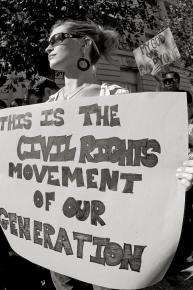Cheering on a victory for equality
reports on the reaction in New York state to a federal judge’s ruling against the Proposition 8 ban on marriage equality in California.
FOR NEARLY the entire summer, Sarah and Ruth Ives of Victor, N.Y., waited anxiously for the final ruling on Proposition 8.
The young couple tied the knot in Connecticut in 2009 after the state legalized same-sex marriage. Though their matrimony is recognized in New York State, the Iveses realize that the ruling in California could make or break the future of same-sex equality. The anticipation weighed heavily on both their minds, especially Sarah’s because—through the Civil Rights Front (CRF) and Empire State Pride Agenda--she advocates diligently for her marital rights and that of others.
“What if it fails?” asked the 23-year-old activist. “What do we do if the people who are chosen to be above all fair can’t even realize the severity of Proposition 8? What if he rules that it’s constitutional to let the majority decide the civil rights of a minority in this country? And, if he did rule out of favor, would I try to stop the hysteria that would surely come after—or join in?”
Ives’ questioning was put to rest, however, when federal judge Vaughn Walker overturned Proposition 8 on August 4, declaring the law unconstitutional. The Iveses celebrated this historic victory by raising their voices at a Prop 8 rally spearheaded by CRF at the Liberty Pole in downtown Rochester.
At five in the afternoon, about 50 people listened to impassioned speeches about how Judge Walker’s decision brings hope to the community that Prop 8 blatantly targeted. The speeches only added to the momentum as GLBTIQ activists and allies began to march down East Avenue, carrying banners and yelling chants like “Hey Obama, let mama marry mama!”
CRF, a grassroots activist group dedicated to the marriage equality struggle, initially scheduled the event for August 31 because organizers knew only that Walker was making a decision sometime this month. But when they received news that the day of decision was August 4, they sprung into fast-action mode.
“I had just come home, ironically, from an organizing meeting for an emergency response rally for the [Day of Decision],” recalled CRF organizer Chelsea Miller. “It was even more of an emergency than I had imagined. Initially, I panicked. I’ve never been in the situation before where I have to help organize an action in less than 24 hours. But we figured it out.”
Melissa Kelsey, a CRF member who also organized the Prop 8 event, shared Miller’s concern: “I immediately began to inform people about the decision and about the rally. I was extremely nervous about the decision, but also really excited about the possibilities for our movement.”
KELSEY WAS one of numerous individuals rejuvenated by the recent Prop 8 verdict. When it passed in the November 2008 elections, the amendment served as a serious blow to the GLBTIQ community in California. Proponents of Prop 8 argued that it would preserve the tradition of marriage and childrearing, while opponents immediately protested, stating that marriage is a fundamental right and should be accessible to everyone.
The homophobic ballot measure not only affected people on the West Coast, but in other states. Todd Plank, an organizer for Marriage New York and Equality Rochester, followed the story from across the country. “It was painful and infuriating to witness the bigotry evidenced by religious groups like the Mormon and Catholic Churches, which funneled so much money and manpower into the Prop 8 campaign,” Plank said.
GLBTIQ couples and lawyers filed lawsuits questioning the logic and validity of the ballot proposition. Walker heard the arguments and investigated Prop 8, saying that he would announce his final decision sometime during the summer of 2010. Meanwhile, CRF planned to organize a rally “to react to whatever the ruling may be.”
Miller was confident that the judge would rule in the favor of the GLBTIQ community. At the same time, she was still apprehensive because the community and its allies experienced many losses. In 2009, the state Senates in New Jersey and New York voted against same-sex marriage, and a ballot measure in Maine ended marriage equality there.
With those type of defeats, it’s no wonder CRF and its supporters took to the streets as loudly as they did on August 4. Their actions and those of others demonstrated that Prop 8 has unintentionally served another purpose: it provoked the inner activist in people within the gay and straight community.
“If Prop 8 did anything, it really got people organizing,” Kelsey pointed out. “We can almost be grateful for Prop 8. It renewed the struggle for many people, and it engaged me in activism for the first time in my life.”
Though this is a clear victory for CRF and other marriage equality supporters, the battle is far from over. Walker suspended same-sex marriages for now so proponents of Prop 8 can appeal his decision. Even if the decision reaches the Supreme Court and is upheld, says Miller, the fight for equality will be constant as long as people are denied the essentials for being who they are—like housing and emergency medical care.
For right now, however, Sarah and Ruth can celebrate a victory that could influence marriage on a federal level for same-sex couples. “We must protect each other as human beings,” Ives advised. “When one group of individuals is hurting, we all need to stand up and fight for what is right. We cannot let our differences let us forget that: an injustice to one is an injustice to all.”



